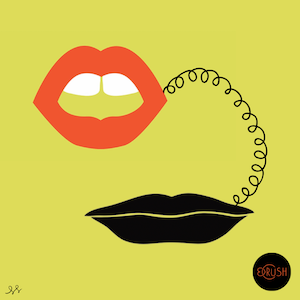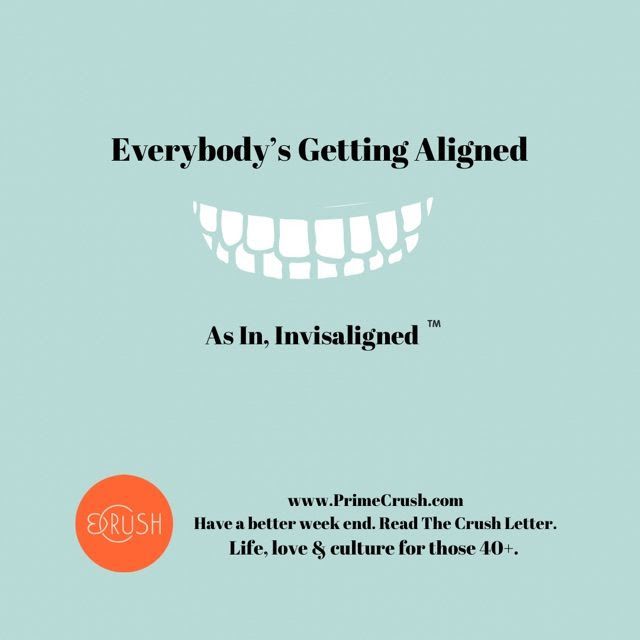
Hello Crush,
I am away this week, but a CRUSH Reader submitted this TOPIX on her relationship with her family "I No Longer Feel the Need to 'Forgive' My Family." TOPIX, as CRUSH Readers know, is a periodic column where we share (anonymously) what's really going on in our relationships at this stage in our lives.
Thank you to the CRUSH Reader who shared her story. When you were raised in a dysfunctional family you get a lot of unsolicited advice about forgiveness (and other things) that, while possibly well-intended, is just plain unhelpful. Sometimes drawing boundaries, choosing what you won't accept and drawing a protective shield around yourself is the best you can do.
This story is a great reminder that we each have to carve our own nuanced path.
If you're new here (welcome!), I'm Dish, the Master of Ceremonies. For more about me and why we're here go here.
In This Letter. +TOPIX. "I No Longer Feel The Need To 'Forgive' My Parents" +Social Media I Loved This Week +Our Song of the Week is it fast enough that we could fly away?

TOPIX: “I No Longer Feel The Need To ‘Forgive’ My Parents”
Midlife has always been that point when we begin to realize that life is getting short. Too short to worry about what other people think. A turning point where people begin to craft the kind of relationships that actually work for them, inside the lines (or out). TOPIX is our way of getting opinionated, courageous conversations started on what living and loving really looks like in midlife now.
"The dynamics that make up a family are so complex and life-long—and personal. Which is exactly why it’s difficult for anyone to give you advice on your family and what you “should” do, how you “should” treat them, in spite of how they treated—and possibly still treat—you."
I am a woman in midlife who grew up watching “Leave It to Beaver” and “The Brady Bunch”. Even then, I knew these were unrealistic depictions of the American family, but also even then, I had some inclination that the core truth about families was that, at the end of the day (or episode) they knew they were a unit.
As I got older, it became more and more apparent that my family was the opposite. It’s true that many families back then didn’t have the tools to learn to do better. There was a real day-by-day mentality in our house—if we made it through the day without incident, freak out or some serious emotional scarring, it was good enough, and we moved on. Kids can’t be expected to repair generational dysfunction, though sometimes there’s this miraculous blossom of love and closeness that forms within a family in spite of all the hurt. A close friend’s parents were openly abusive, but she and her siblings were the closest I’d ever seen, even compared to a sappy television sitcom. It’s not a unique story and it takes many various forms, all of which defy analyzing. It is what it is. Sometimes, what it is, is a strong outcome of love and bonding in spite of the roughest of circumstances.
But that didn’t happen for me.
The dynamics that make up a family are so complex and life-long—and personal. Which is exactly why it’s difficult for anyone to give you advice on your family and what you “should” do, how you “should” treat them, in spite of how they treated—and possibly still treat—you.
This whole issue gets more complicated as we approach midlife because our parents and family members begin to grow so much older and dependent on us. And yes, they are closer to the end of their lives. It’s expected that we will all become caretakers. As best as I can, I have become that, too. However, after literal decades of trying to repair the damage my family has caused, trying to bring us closer, trying to overlook appalling and abusive behavior, I’ve finally decided that it’s not important for me to work on this anymore, there’s simply nothing else to repair. I know now how stereotypical it sounds for that one “child” to go to therapy because no one else is going—and then failing miserably at repairing everyone else.
I’ve read all the books and I’ve approached this from every angle. I know that my parents are human and they, perhaps, “did their best”. Their best was toxic and damaging. After a lifetime of tactics and communication, their behavior hasn’t changed. It created gigantic cracks that rippled amongst all of my family members. I cannot be a fixer anymore. This is what we have now.
It’s taken me an entire lifetime to realize that I do not need to forgive my parents. In fact, I don’t forgive them. Not at all. I actually don’t need to feel anything for them that doesn’t feel right to me. This might seem so obvious to some of you reading this right now, but it took me a lifetime to come to this place. While I won’t desert them at their time of need—and I don’t “hate” them by any stretch—it’s important for me to create a healthy, necessary separation for the remaining decades of my own life.
Removing the pressure to forgive my parents has allowed me to move forward to create the family–no matter how unconventional–I always wanted. We are taught that forgiveness is the road to progress, but that’s simply not the case for all of us. As I said, family dynamics are not “one size fits all”. Not even the most seasoned experts know you fully or what you've been through. Sometimes you need to do what’s best for you.
Stay tuned to this continuing series. Got a TOPIX? Write to me! Dish@PrimeCrush.com.

Social Media I Loved This Week








Song of the Week
Fast Car by Tracy Chapman
This 1988 hit from Chapman's debut album captures exactly what I mean when I say that sometimes when you were raised in a dysfunctional family the best you can do is "fly away."


Some Past Related Stories You Won't Want to Miss:




![]() XO,
XO,
Dish

